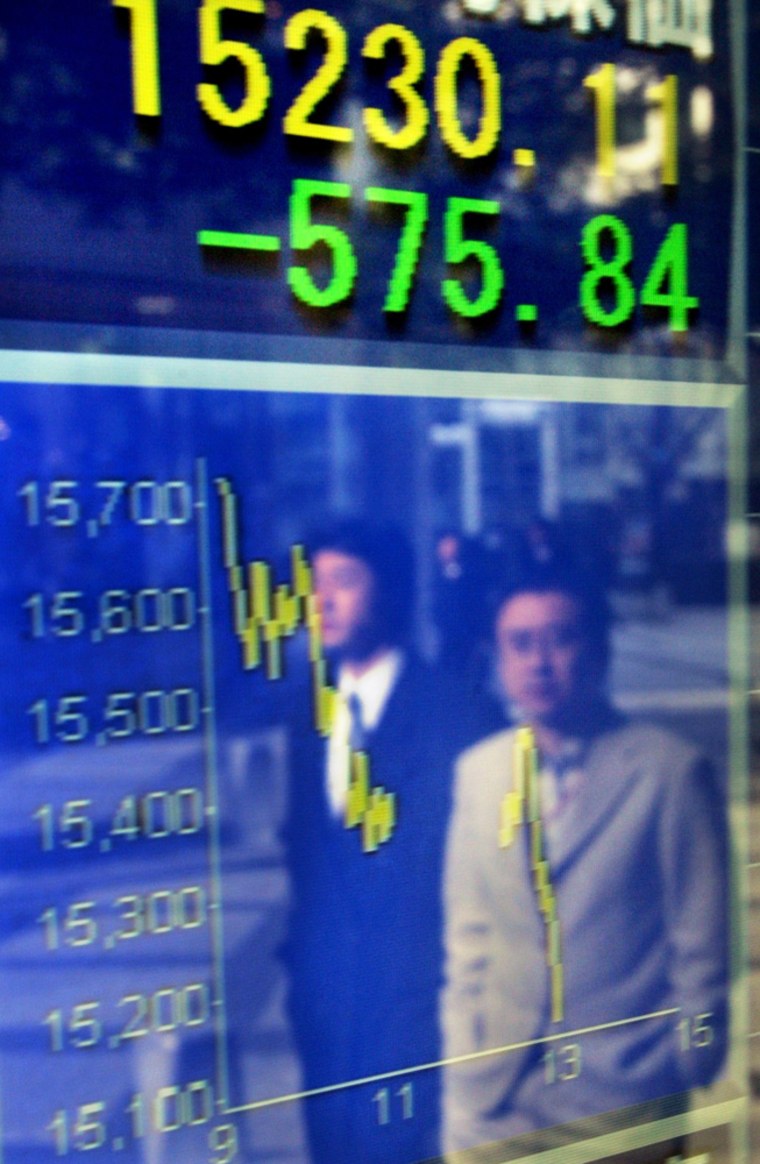An ill wind from Japan has put a chill into global financial markets just as oil prices are spiking on political tension and central bankers are warning darkly that investment-friendly borrowing costs cannot persist.
Is it all just an excuse for some profit-taking after a lucrative run up in asset prices, or does something wicked this way come?
For the most part, longer-term investors appear to favor the former, seeing Tuesday’s sell off in equities and flight to safe havens as a temporary blip.
“A corrective phase shouldn’t be a surprise,” said David Shairp, global strategist at JP Morgan Asset Management.
But the stock slide does highlight the fact that with investors loaded up on equities and hungry for risk in their global portfolios it doesn’t take much to trigger a sell off.
It also amplifies Bank of England Governor Mervyn King’s veiled “irrational exuberance”-style warning this week that assets are floating on thin real interest rates which won’t last.
The trigger this time was in Japan, where investors have chopped 6.8 percent off the Nikkei index this week, unnerved by a probe into suspected securities violations at internet firm Livedoor and, latterly, by disappointing results from U.S. tech firms Intel and Yahoo Inc.
The contagion spread to Europe and Wall Street, where some major stock indexes were down more than 1 percent.
Oil added to the mix, trading near $67 a barrel as tensions grew over Iran’s nuclear program and militants threatened foreign oil producers in Nigeria.
Temporary blip?
The argument for this sell off being a temporary blip is that there is nothing fundamental -- in Japan or elsewhere --that has changed and that equities have been having a pretty good time and are ripe for a quick cooling.
Even after this week’s losses, for example, the Nikkei is still up some 34 percent over the past 12 months. European shares have gained more than 22 percent in the same period.
This is particularly hot given many investors consider the world to be in a low inflation, low returns environment.
Eric Lonergan, head of global macro research at Cazenove, notes also that much of the gains have been steady, marked by very low volatility -- that is, without mini-corrections along the way.
So a bit of a row back might be in order, particularly if all else is running relatively smoothly.
“If we think about the fundamentals, global growth is still good, business confidence is generally rising, inflation is close to target in most countries, central bankers are not talking aggressively,” said Tony Dolphin, strategy director at Henderson Global Investors.
He said his firm was not likely to make any changes as a result of the current weakness, but that if Japanese equities continued to fall for some time, it might look to buy more.
Others suggest that even with the run up in prices, equities are still the place to be and should outperform again this year, if not with quite the same vigor as 2005.
“I don’t think we have a substantial overvaluation,” said Lex Hoogduin, chief economist at Robeco Group. “I still expect that equities will be more attractive than bonds.”
Risks up
None of this should be taken, however, to suggest that there are no longer-term threats to investments.
Investors have entered 2006 with heavy equity allocations --double that for bonds, according to Reuters latest surveys --and demanding little in the way of risk premia for their money.
Other assets including gold, commodities, high yield bonds, government debt and property are all being eagerly sought.
Current strategies are therefore highly vulnerable to sudden changes and analysts like Cazenove’s Lonergan expect this year to be far more volatile than last.
The spike in oil prices has also renewed concerns about the impact of expensive crude on corporate earnings. Investors were getting used to the relatively lower price of the last quarter, but now it is up again.
“It’s at the top end of the recent range,” Henderson’s Dolphin noted.
But the biggest, longer-term threat may be the one highlighted by BoE’s King -- that asset prices of all hues are floating along on a sea of cash thanks to liquidity that cannot be guaranteed to last.
Some strategists believe that markets are being complacent about interest rates and that anything that prompts central banks to be more aggressive could start pulling the ladder from under investors.
Not surprisingly, then, eyes are fixed less on Japan and the current sell off than on the Federal Reserve for any sign that it may decide to continue tightening beyond what is expected.
